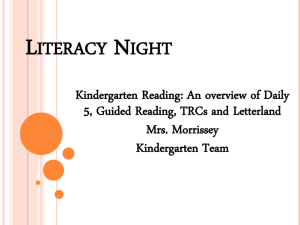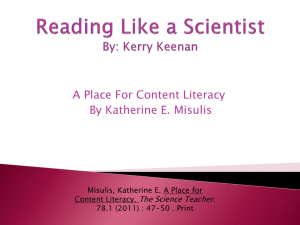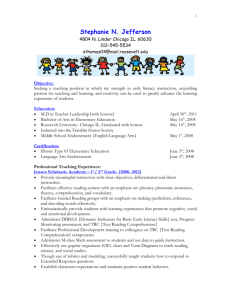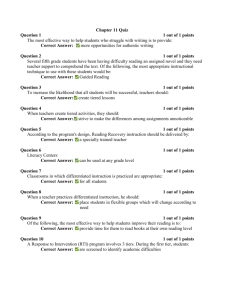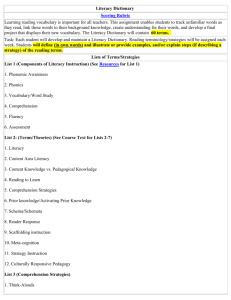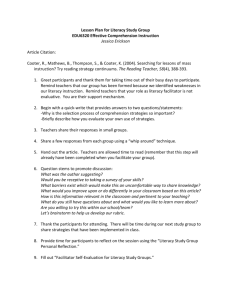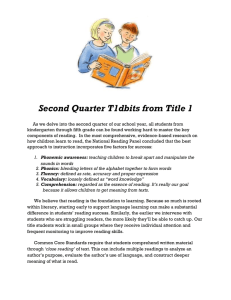Pre-Kindergarten Literacy Program What the
advertisement
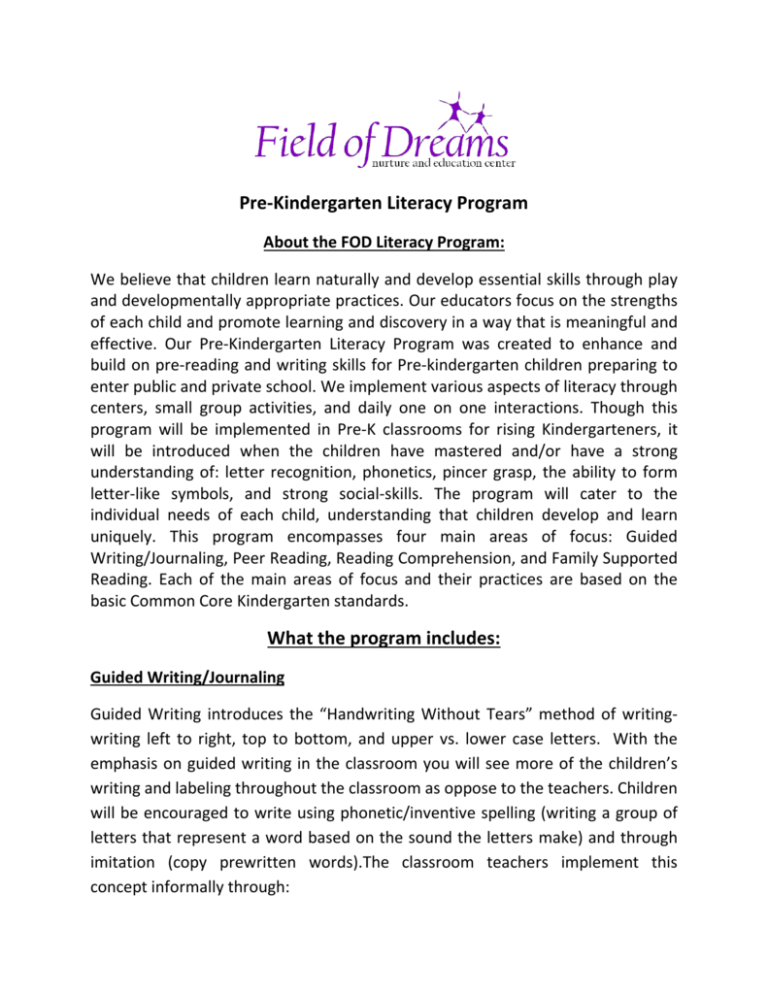
Pre-Kindergarten Literacy Program About the FOD Literacy Program: We believe that children learn naturally and develop essential skills through play and developmentally appropriate practices. Our educators focus on the strengths of each child and promote learning and discovery in a way that is meaningful and effective. Our Pre-Kindergarten Literacy Program was created to enhance and build on pre-reading and writing skills for Pre-kindergarten children preparing to enter public and private school. We implement various aspects of literacy through centers, small group activities, and daily one on one interactions. Though this program will be implemented in Pre-K classrooms for rising Kindergarteners, it will be introduced when the children have mastered and/or have a strong understanding of: letter recognition, phonetics, pincer grasp, the ability to form letter-like symbols, and strong social-skills. The program will cater to the individual needs of each child, understanding that children develop and learn uniquely. This program encompasses four main areas of focus: Guided Writing/Journaling, Peer Reading, Reading Comprehension, and Family Supported Reading. Each of the main areas of focus and their practices are based on the basic Common Core Kindergarten standards. What the program includes: Guided Writing/Journaling Guided Writing introduces the “Handwriting Without Tears” method of writingwriting left to right, top to bottom, and upper vs. lower case letters. With the emphasis on guided writing in the classroom you will see more of the children’s writing and labeling throughout the classroom as oppose to the teachers. Children will be encouraged to write using phonetic/inventive spelling (writing a group of letters that represent a word based on the sound the letters make) and through imitation (copy prewritten words).The classroom teachers implement this concept informally through: • Independent journaling with open ended questions, thoughts, and ideas • Small group activities • Personal documentation- children will document and/or label their own work (art work, writing center, etc.) Peer Reading Peer Reading focuses on the social interaction of children and their peers during the reading process. Peer reading is accomplished by dividing the children into groups of two or three and allowing them to “read” short familiar and unfamiliar stories to each other by looking at illustrations, familiar letters and words (sight words), characters, etc. Through this method of literacy, children are able to develop language, communication skills, social development, letter recognition, phonetic and comprehension skills. These practices are implemented weekly via small groups and center time. Reading Comprehension In the Field of Dreams literacy program, Reading Comprehension is introduced on the beginning level. Comprehension will take place through discussion by asking and answering questions related to stories that are read aloud (i.e. “who are the characters in the story”, “why do you think [this] happened”, “what happened next?”, etc.). Reading Comprehension is also supported through writing activities. Children may be asked to draw their favorite part of the story and discuss it with their teachers and peers. This sets the foundation for more complex comprehension skills that are introduced via Common Core standards implemented by South Carolina public school system beginning in Kindergarten. Family Supported Reading Family Supported Reading focuses on the Home-School connection, which is a vital part of our Pre-Kindergarten Curriculum at Field of Dreams. It is important to develop continuity between what is being taught at school and the home environment. Having this consistency builds understanding and reinforce new and sometimes challenging skills. However, it is our goal to accomplish this through informal play, guidance, and one-on-one relationships. Having a Home-School connection promotes opportunities for bonding, social-interactions, and selfconfidence that connects the school environment to home. In the beginning of the school year (for most children-August/September) teachers will begin using the Home Activity Calendar that suggest daily activities for children to do with their families. These activities directly reinforce skills that are introduced at school and are based on the SC Early Learning Standards. Henceforth, based on the individual need of each child, teachers will implement the Family Reading Activity. Teachers will incorporate B.O.B. Books informally in lessons and activities throughout the month. This nationally recognized literacy company specifically produces books that promote phonetic awareness, letter and word recognition, and self-confidence- all of which are components of pre reading skills. Each child will be able to take home a different B.O.B. book each month which will be accompanied by simple activities children can do at home with their families each week that correlate with what is being introduced in class. Again, the purpose of implementing Family Supported Reading is to promote social-interactions and continuity from school to the home environment. B.O.B. Books is a "no pressure" system that allows children to reinforce at home what is being taught at school. An example of what this form looks like is attached to this literacy program outline. Outcome The Field of Dreams literacy program sets a strong foundation for reading and writing skills that are introduced in the Kindergarten classroom through developmentally appropriate activities. With the utilization of South Carolina Standards, research, and supportive educators, our program offers a unique approach to learning that is individualized for each child’s natural, educational development. By implementing these practices, it allows children to learn without pressure in a way that is meaningful. This builds lifelong skills of selfconfidence, curiosity, social development, independence, and creativity. For this we know, is the true way children develop and learn.
